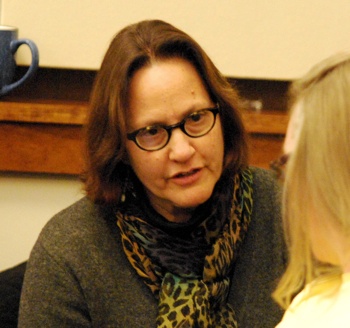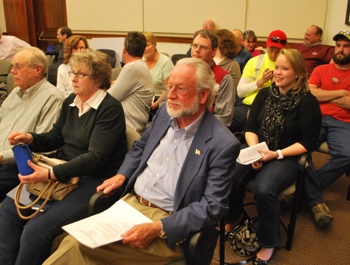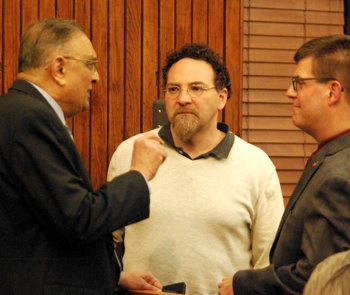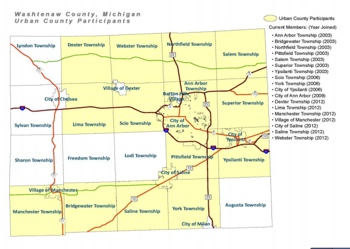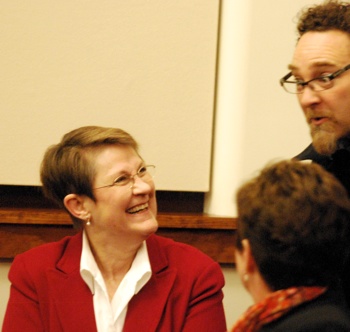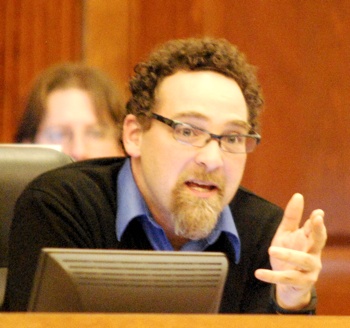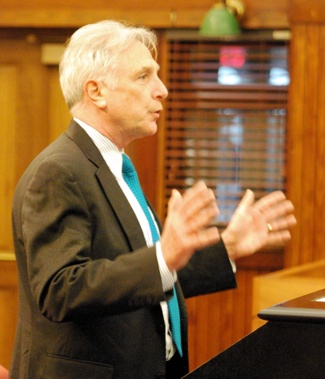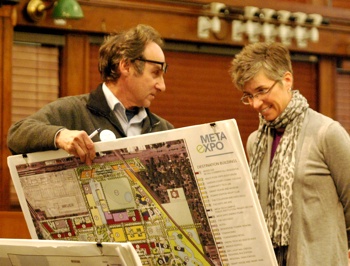Washtenaw County board of commissioners meeting (April 2, 2014): Responding to several homeless residents who spoke during public commentary, commissioners spent about 90 minutes on April 2 discussing how to address short-term and long-term needs of the homeless.
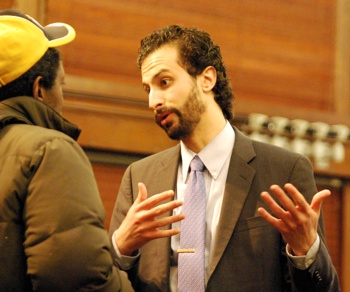
Yousef Rabhi (D-District 8), chair of the Washtenaw County board of commissioners, talked with an advocate from the homeless community before the April 2 county board meeting. (Photos by the writer.)
The board ultimately voted to direct county administrator Verna McDaniel to work with community partners to address immediate needs of the homeless. In general, McDaniel has budgetary discretion to spend up to $50,000 on professional services contracts, and up to $100,000 for any proposed goods, services, new construction or renovation. Later in the week, she allocated $35,000 to the Delonis Center – which is run by the nonprofit Shelter Association of Washtenaw County – to keep its nighttime warming center open through April 30. The warming center had originally been slated to close for the season on April 6.
The resolution also directed the administration to develop a plan by May 7 for updating the county’s Blueprint to End Homelessness, which was adopted in 2004 but appears to be dormant. The process of updating that plan is to be completed by Oct. 1, 2014.
Conan Smith (D-District 9) had initially suggested allocating $40,000 to the shelter to keep the warming center open another month. Other commissioners had concerns about throwing money at the shelter without any input from shelter staff, and without knowing specifically how the money would be used. Because the item hadn’t been included on the agenda, representatives from the shelter staff didn’t attend the meeting.
Some commissioners thought there should be a strategic plan in place before any additional funding is given – and they seemed to assume that such a plan doesn’t already exist. Mary Jo Callan, director of the county’s office of community & economic development, noted that the city of Ann Arbor and several other entities are working on this issue, in partnership with the Shelter Association. The board had received a briefing from the association’s executive director, Ellen Schulmeister, at their Feb. 6, 2014 working session.
The vote on the resolution was 6-2, over dissent from Republicans Dan Smith (District 2) and Alicia Ping (District 3), who both objected to the process. Rolland Sizemore Jr. (D-District 5) was absent.
Dan Smith called it “completely and entirely inappropriate” to be making policy and budgetary decisions on the fly, in response to a few people who showed up to speak during public commentary. He supported updating the Blueprint to End Homelessness, but thought it was a discussion that should take place at a working session before taking action at a regular board meeting. Yousef Rabhi (D-District 8) responded by saying that commissioners are elected to work for the people. When people come to the board, it’s important to address their concerns in a serious manner, he said.
Because of the length of the meeting, some men who were staying at the shelter missed the 9:30 p.m. curfew. Typically, anyone showing up after that time isn’t allowed inside. Greg Dill, the county’s director of infrastructure management, contacted the shelter staff and made arrangements for the men to be accommodated.
In other action, commissioners gave initial approval to a two-year pricing proposal – for 2016 and 2017 – to provide police services to local municipalities through contracts with the county sheriff’s office. Some commissioners expressed concern about the financial sustainability of this approach to funding police services, and cited the need for new revenue sources for public safety. Sheriff Jerry Clayton was on hand to present the pricing proposal, and supported suggestions to seek a new funding source. As he’s done in the past, Clayton characterized the issue of public safety as one that encompasses economic development, human services and other aspects of the community.
Commissioners also gave initial approval to a new brownfield redevelopment plan for the Thompson Block in Ypsilanti’s Depot Town, and took final action to add autism coverage to the health care benefits for employees. They postponed action on a resolution related to the county road commission until May 7, following an April 17 working session that will focus on that issue. The board also was briefed on the 2013 audit and comprehensive annual financial report (CAFR), and received an award for financial reporting from the national Government Finance Officers Association.
During communications, Felicia Brabec (D-District 4) reported that the review of applications is underway for the current cycle of coordinated funding, a partnership to fund social service agencies that involves the county, city of Ann Arbor, and several other entities. For this cycle, 105 applications were received, representing $8.7 million in requests. The amount of available funding this year from all partners is $4.4 million. “So it’s a difficult, difficult process,” she said. Funding recommendations will be brought to the board in May.
On April 2, the board also honored five local businesses and institutions with “healthy workplace” awards, and recognized the Ann Arbor Community Center for 91 years of service. [Full Story]




